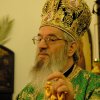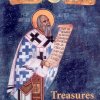The Divine provision brought the spiritual father of the Monastery Studenica, Bishop Jovan, to continue the work left by the equally most esteemed and humblest spiritual father of the Monastery Hilandar, Bishop Chrysostom.
As an accomplished monastic with the spiritual wealth he attained in the Studenica Monastery, he enriched his flock and clergy. Very soon he gained respect and confidence of his clergy and the faithful.
Bishop Jovan was born in 1950 of father Radojko and mother Stana Mladenović in the village of Dobrace, near Arilje, Serbia. He finished elementary school in his village. At the age of twelve, he went to the Klisura Monasteiy where he remained for one year and then went to the Studenica Monastery. He attended the monastic school in the Ostrog Monastery from 1967 until 1969. He was ordained a hierodeacon in the Studenica Monastery on April 25, 1971. He retained his baptized name of Jovan. Rt. Rev. Vasilije, Bishop of Žiča ordained him as hieromonk in 1973. He graduated from St. Sava Seminary in Belgrade in 1974 and from Theologcial College in Belgrade in 1980.
In 1986 he was elevated to a protosyngelos and in 1989 to an archimandrite.
He was appointed Abbot of the Monastery Studenica on July 26, 1981. He remained at that position until 1993, when he was elected a titular Bishop of Tetovo, vicar to His Holiness, and charged with administering Serbian Orthodox Dioceses in the former Yugoslav Republic Macedonia. At its regular session in May 1994 the Holy Bishops’ Assembly elected Bishop Jovan as a Bishop of the Western Diocese. He was installed to the See of the Western American Diocese Bishops in the Cathedral of St. Stevan in Alhambra, California by His Holiness Patriarch Pavle on September 18, 1994.
In 2000, two missions, two monasteries, and two sketes have been received under Bishop Jovan’s omophorion (in California St. Herman monastery, St. Xenia skete, St. Andrew mission in Redding, St. John mission in Oregon, St. Paisius monastery in Arizona, and two skeres in Alaska.) Most of the people in these missions and monasteries are American converts to Orthodoxy.





